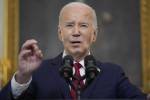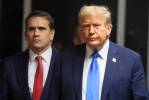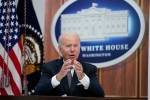On NATO, Trump channels George Washington
Of all the charges hurled at Donald Trump during the Democratic National Convention, perhaps the most provocative is that he wants to abandon NATO and surrender to Russia.
President Obama said that Trump “cozies up to Putin,” and “tells our NATO allies that stood by our side after 9/11 that they have to pay up if they want our protection.”
The Democratic VP nominee, Tim Kaine, said, “My son Nat deployed with his Marine battalion just two days ago. He deployed overseas to protect and defend the very NATO allies that Donald Trump says he now wants to abandon.”
The accusation stems from an interview that Trump gave The New York Times. He was asked, “Can the members of NATO, including the new members in the Baltics, count on the United States to come to their military aid if they were attacked by Russia?”
Trump responded, “Have they fulfilled their obligations to us? If they fulfill their obligations to us, the answer is yes.”
The Times then asked what if the allies had not fulfilled their obligations. Trump answered, “Well, I’m not saying if not. I’m saying, right now there are many countries that have not fulfilled their obligations to us.”
Earlier in the interview, asked about American troops in South Korea, Trump said, “This is not 40 years ago. We are not the same country and the world is not the same world. … We don’t have the luxury of doing what we used to do.”
There are several ways to interpret his comments.
First, he’s establishing an opening position in an eventual negotiation with our allies over who pays what for defense. Right now, there’s a reasonably strong case to be made that America is overpaying to defend other countries.
America spends 3.3 percent of its GDP on defense, according to both the Office of Management and Budget and the World Bank. As for the Baltics, Estonia spends 2 percent, Latvia, 1.1 percent, and Lithuania, 1.1 percent. For comparison’s sake, Israel spends 5.4 percent of its GDP on defense. South Korea spends 2.6 percent and Japan, 1 percent.
As for Trump’s idea that other countries should help pay, it’s not unprecedented. When Bill Clinton talked about NATO expansion in 1997, he said, “I do believe that the nations involved should pay most of the costs themselves.”
Nor is it clear that including the Baltics in NATO was such a great idea. One of Bill Clinton’s defense secretaries, William Perry, last year blamed “premature” NATO expansion during the Clinton administration for the deterioration of U.S.-Russia relations.
George Kennan, the father of the Cold War containment strategy, told Thomas Friedman in 1998: “This expansion would make the Founding Fathers of this country turn over in their graves. We have signed up to protect a whole series of countries, even though we have neither the resources nor the intention to do so in any serious way.”
The reference to the Founding Fathers was a tip of the hat to George Washington. In his farewell address, the president who as a general had won the Revolution against Britain asked dismissively, “Why, by interweaving our destiny with that of any part of Europe, entangle our peace and prosperity in the toils of European ambition, rivalship, interest, humor or caprice?” Then he answered the question: “It is our true policy to steer clear of permanent alliances with any portion of the foreign world.”
Washington added: “We may safely trust to temporary alliances for extraordinary emergencies.”
Perhaps NATO, a Cold War alliance against a Soviet Union that no longer exists, is worth rethinking in favor of a new temporary alliance against Islamist extremism. That’s an alliance in which the United States, Europe and Russia might have a common cause.
Ira Stoll is editor of FutureOfCapitalism.com and author of “JFK: Conservative.” His column appears Sunday.























